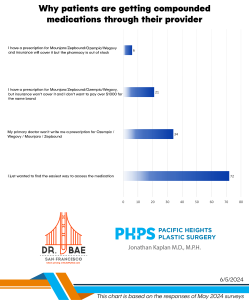Earlier today, a viewer of my YouTube video on the phenol-croton-oil deep chemical peel, asked about the risk of hypopigmentation (skin lightening). In other words, with a deep chemical peel, aside from improvement in deep wrinkles, does the skin lose pigment and result in patches of lighter skin?

As you can see in this pre-treated patient, she has very deep lines around the mouth. A facelift alone won’t remove these “inscripted” lines. A chemical peel or laser (including Fraxel) are needed to remove the top layer of skin and in doing so, remove these deep lines. As with any potential benefit of a surgical or non-surgical treatment, there’s an associated risk. And when it comes to deep chemical peels (not the type you get from your aesthetician – that’s a much lighter peel), one of the main risks is hypopigmentation.

This patient to the right is the same patient as above, but after she has received a deep chemical peel using a mixture of phenol and croton oil. The skin around the mouth is without any wrinkles! It’s really amazing how all of the wrinkles in the pre-procedure photo have been erased, as though they were Photo Shop’d. But I assure you this is not Photo Shop. This is the benefit of the phenol croton oil peel. It gets deeper and is more effective than most lasers. But as a peel goes deeper, it kills more melanocytes, the cells responsible for pigment. Because these cells are no longer present to produce melanin, or pigment, the skin becomes hypopigmented and becomes lighter.
You might ask, then maybe a laser will be better and cause less hypopigmentation? Regardless of whether a laser or chemical peel is used, hypopigmentation is a risk if the skin is treated deeply enough to remove the wrinkles. A more shallow peel may not result in hypopigmentation but it also won’t treat the wrinkles deeply enough and you’ll still be left with lines you don’t want. In summary, if you want the wrinkles gone, you have to understand and be willing to accept the risk of hypopigmentation.
The best way to minimize hypopigmentation from a deep chemical peel is to use hydroquinone, a bleaching skin cream before and after your chemical peel. While this may lighten your skin, it does so uniformly all over the face so that patches of hypopigmentation are less noticeable.
So you have a decision to make: what do you hate more – your wrinkles or the potential for hypopigmentation?! Enjoy the video below.
For more information on pricing of a deep chemical peel by Dr. Kaplan, click here.
Click here for the original blog post written by Dr. Jonathan Kaplan for BuildMyBod.




